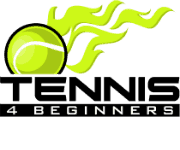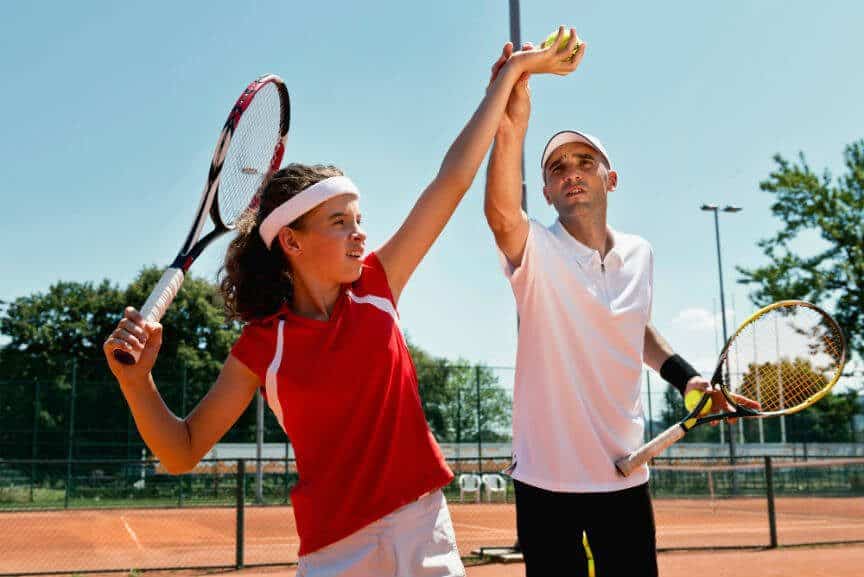Tennis is a game that can be enjoyed at just about any age. Whether you start playing tennis for the first time after age 50 or under 10 years of age, with enough practice and dedication you can learn to play the game and become skilled at it.
If you start late in life, there are some limitations to how far you will progress. This is because your athletic ability and coordination will already be somewhat set by this point. That’s not to say that you can’t enjoy the game and even become relatively good. But, if playing competitively is your goal, then it makes sense to start early in life.
In general, the younger you start the better. At the same time, as a parent, you may not want to start your child too early. It could lead to frustration and potentially giving up the game. After all, the goal is to develop a player to enjoy the game for a lifetime.
So what is the ideal age to start playing tennis? Most tennis instructors would say that about 5 years old is the youngest age for most kids to start playing tennis. This is about the age when kids are starting to develop the necessary motor skills, attention span, communication and listening skills to be able to grasp what is being taught. Anywhere from 5-9 years of age is a good starting point.
It is possible to start a bit later in the 10-14 year range and still develop to be a highly competitive player, but keep in mind that it takes many years to develop into an elite player. So, all things being equal, those who gain an earlier start will reach this level sooner.
5 to 9 Years of Age
This is the ideal age to start playing tennis to get that early start. At this age, kids can learn fairly quickly and absorb much of what is being taught. This is a stage where children are acquiring basic habits and building a foundation for physical and social development.
What they are taught at this point in their lives becomes permanently ingrained. It’s therefore important to introduce children to proper technique and correct form at this age so that they develop good, rather than bad habits.
It is also important to encourage and allow them to develop at their own pace. This is an age where children play sports for enjoyment or to be with friends. For this reason, it’s critical not to push them too hard. This should not be a competitive stage, the focus should be on developing their skills.
10 to 14 Years of Age
This is usually a time when children begin to transition from foundational development to more specialized training. This is still a time when players can develop their game to play competitively later in life, though it may require some catching up.
Chances are, at this age children will be expected to train longer and more intensely than before. They can expect to spend more time refining their skills. Most children by this point will have also narrowed down their sports activities to one or two sports.
15 to 19 Years of Age
Young adults at this point will have developed the ability and dedication to be an elite performer. Training will be more intense and longer and involve high-volume and high-repetition drills to help them further refine their skills.
At this point, competitiveness starts to set in. Those who started at a younger age will see the time they invested in practicing start to pay off. These will be the players that stand out among their peers in terms of skill and technique.
Starting at this age can still lead to developing good form and playing the game well. However, chances are by this point developing to be a pro circuit level player will be very difficult to do. Players at this age are already receiving very specialized and advanced training.
20 to 29 Years of Age
By this point, athletes should have developed all of the technical, tactical, physical, and mental skills necessary to compete at the elite and professional levels. These are the peak performance years where all the hard work gets put into practice.
If you start playing tennis at this age, chances are you are looking to play recreationally. Playing at the elite level requires many years of practice and dedication. If you were to start training very hard to reach this level of play, chances are you would be well into your 30’s before achieving your goal.
By that point, you would be past your physical prime. Most professional tennis players peak at around age 28. In addition, by the time you are in your 20’s, your physical and athletic skills are pretty much set. It would be difficult to reach that level of play.
30 and Above
By this point hopefully, you will have had positive experiences playing the game of tennis and be looking to continue playing for the rest of your life. You may look to join clubs with other players or play in local tournaments, whether for the competition or for fun.
You may also choose to coach or teach the game to younger generations. If you start playing tennis at this time, it’s usually for social reasons or because you want to get out and exercise. Tennis is a great sport to play at this point in your life for the health benefits it can bring.
As long as you are healthy and capable of engaging in any aerobic or anaerobic exercise activity, you can enjoy the game. Tennis is a sport that can be played and enjoyed well into the latter years of life. While competitive training has been the focus so far, recreational play is the most common reason for people to participate in the sport.
Playing for Fun vs Developing for Competitive Play
People play tennis for various reasons. Some simply want to enjoy the game and spend time with friends. Others are looking to develop into competitive players and potentially play on the pro circuit eventually. Some might be looking to earn a spot on their school or college team.
Others still may just be wanting to try out a new sport to see if they like it. How old you should be to start depends to some extent on which of these camps you fall into. Keep in mind as well that there are many factors that determine how far you progress in the game beyond starting age.
Here are some of those factors. Any of these or the combination of all can lead to a player developing more quickly, even if they start a bit later in life.
How Often and Effectively do You Practice?
One of those additional factors is how often you practice. Not only how much, but the quality of practice as well. If you are putting in at a minimum 3 days of practice per week – 5 would be ideal – you can develop your game significantly more than someone who practices once or twice a week.
It’s not uncommon to see players develop into top performers by simply putting in that extra bit of work during practice and after practice. There are players who, by putting in countless hours hitting against the wall after practice, working incessantly on their conditioning, serves, volleys and groundstrokes, can go from beginners to top-level performers in a fairly short amount of time.
The quality of practice is also important. Are you pushing yourself to improve each time you set foot on the court? Are you practicing the right drills? Is your tennis partner about the same level as you, better than you or are they a professional instructor?
Are You Receiving Professional Instruction?
Nothing can replace the instruction you get from a good tennis professional. They will observe your technique and give you tips and suggestions on how to improve your strokes much more quickly than you would otherwise.
In addition, by hitting against someone at that level, you are going to improve your game much more quickly. You will already be exposed to playing against someone at a high level so that when you encounter such an opponent in the future, you will not be thrown off.
Tennis instruction, of course, is expensive. If you are lucky and one or both of your parents are or were at one point professional circuit level players, then you might be able to get the necessary training to help you develop into an elite player.
For most this is not an option. However, even if on a tight budget, you can still take a few lessons with a pro trainer and have them observe and tweak your technique. At that point, it becomes a question of regularly practicing what you are taught.
Another option is to attend a group clinic taught by professionals. While you will not receive one-on-one instruction, these can still be very helpful in learning or adjusting your technique.
Are You Working on Your Conditioning?
General physical conditioning is an important aspect of becoming a good tennis player. Tennis is a fairly intense anaerobic sport that requires a great deal of stamina. Those who work hard on their conditioning will see benefits in their game.
If you want to excel at the sport you need to exercise regularly. Running, playing other sports such as soccer or basketball can also be beneficial. Long distance jogging, particularly if it involves climbing and descending hills can really help develop your stamina.
Some amount of strength training is also beneficial, especially for the legs. You also want to work on drills to develop your foot skills. If you are well conditioned, you will see during matches – particularly long ones – how much of an edge it can give you over your opponent.
How Athletic Are You?
While there is no substitute for hard work, the truth is there are some people that are just more athletic and develop their skills more quickly than others. If you are fortunate enough to be one of those people, you will likely progress more quickly than others.
You might find that you are able to pick up on drills and techniques more quickly. During play, you might find you have an edge in your ability to cover the court, speed, stamina and overall conditioning.
If you are not that fortunate, don’t fret, at the end of the day, hard work and dedication are what makes the difference between being a decent player and being a great player. Athleticism is a bonus, as in any sport, but you will still need to put in the hours to get to the level you want to achieve.
Conclusion
Whatever age you are presently at and whatever the goal, there is no reason to not start playing tennis right away. Tennis is a sport that can be enjoyed at just about any age. It’s also a sport that can be enjoyed recreationally for fun, exercise, or social interaction.
Those who play the sport with these goals in mind can start at any age and learn to enjoy the game. Those who play the sport with the goal of becoming elite players, or potentially playing professionally will need to get an early start and practice efficiently and consistently over many years.
Because of the time it takes to develop into an elite level player, and the fact that players reach their peak in their mid-twenties, it’s a good idea to start as early as 5-9 years of age, and no later than 10-14 years of age. Starting early combined with putting in lots of hard work over many years can help you develop into a top-tier tennis player.
Share this Post

